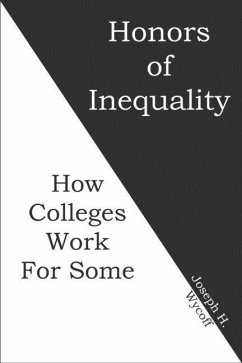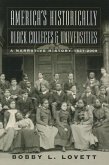Honors of Inequality is a historical analysis of the origins and key contributions to the scholarship about American higher education authored by tenured faculty and professional scholars during the last half of the twentieth century. Higher education--as an organized discipline or field of study--is a relatively recent invention in the history of colleges and universities. Historians trace the origins of the modern university to the medieval era in Europe about 1,000 years ago. The professional associations of the modern disciplines for historians, economists, sociologists, and other social scientists first organized in the late 1800s, or about 150 years ago. By comparison, the academic study of higher education as an institutional or cultural phenomenon is much more recent, arguably the 1950s. More exactly, the Association for the Study of Higher Education (ASHE) formed less than fifty years ago, 1976.Simply put, the origins of the university and the modern professional associations for the social sciences differ markedly from the origins of higher education as a field of study and an area of scholarly expertise.The historical dating alone suggests that the formal organization of higher education as a field of study has little to do with the general principles of higher learning cultivated by universities over centuries and the investigation of the human condition advanced by social science paradigms over the one-and-one-half centuries. Why, for instance, did universities neglect to study the nature of higher learning as a distinct branch of the liberal arts or as a discipline akin to medicine, law, or theology during the first several centuries of their existences? How did the social scientists and scholars who first organized professional academic organizations in the late 1800s overlook higher learning as a foundational social and cultural phenomenon akin to history, economics, political science, and sociology in the human condition?It is no accident that higher education as a field of study emerged in the decade following the professional organization of administrative researchers, the implementation of the 1960 California Master Plan, and the student unrest on American campuses during the 1960s. The power to define what is and is not scholarship about higher education as a field of study presented a welcomed opportunity for faculty to exercise their profound influence over the direction of college and university administration after 1970. Honors of Inequality offers a critical history of this new field of study, uncovering the ideological, political, social, and cultural values motivating early scholars. Its historical account of campus politics offers insights--to college-goers, parents, faculty, administrators, policymakers, legislators, and the many other stakeholders in higher education--into the reasons that colleges remain powerful instruments for shaping social and economic inequality in the twenty-first century.
Hinweis: Dieser Artikel kann nur an eine deutsche Lieferadresse ausgeliefert werden.
Hinweis: Dieser Artikel kann nur an eine deutsche Lieferadresse ausgeliefert werden.








